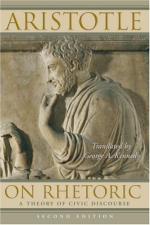
|
| Name: _________________________ | Period: ___________________ |
This quiz consists of 5 multiple choice and 5 short answer questions through Book II, Chapters 1-11.
Multiple Choice Questions
1. What did Aristotle think the extent of virtues was based on?
(a) Certain circumstances.
(b) Certain accomplishments.
(c) Past associations.
(d) Past actions.
2. How did Aristotle think a political orator should convince an audience of their plan?
(a) By showing that it was just as good as all other options.
(b) By showing that it was better than all other options.
(c) By showing that it was better than most other options.
(d) By showing that it was just as good as most other options.
3. Which one of the following was not included by Aristotle as a cause for the feeling of calmness?
(a) When someone has been wronged in an unintentional way.
(b) When someone has helped a person.
(c) When someone does not associate with anyone.
(d) When someone is not known well by a person.
4. Why did Aristotle think the completion of a difficult task was pleasant?
(a) What is difficult to get requires extra effort that makes it more rewarding.
(b) What is diffcult to get requires dedication that makes it more rewarding.
(c) What is difficult to get is mostly better than what is easy to get.
(d) What is difficult to get is always better than what is easy to get.
5. According to Aristotle in Book I, Chapter 1, what was not a concern of rhetoric?
(a) An academic subject.
(b) A vague subject.
(c) A specific subject.
(d) A hypothetical subject.
Short Answer Questions
1. How did Aristotle think rhetoric could be useful in terms of one's beliefs?
2. In addition to the relationships with other countries, what other part of war and peace did Aristotle explain?
3. How many causes of human action did Aristotle detail in Book I, Chapter 10?
4. How did Aristotle describe the feeling of friendship?
5. Why might a speaker use the ethical appeal?
|
This section contains 339 words (approx. 2 pages at 300 words per page) |

|




